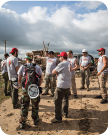Assertiveness and Argumentativeness
Although people who experience communication apprehension are less likely to speak up in groups, there are also people whose traits make them more likely to speak up. Have you noticed when working on class projects that some members of your group always seem to voice their opinions boldly or never seem to be afraid to speak out when they disagree with group members? These are likely to be students with assertive and argumentative personalities. Assertiveness refers to the use of communication messages that demonstrate confidence, dominance, and forcefulness to achieve personal goals. For example, you are being assertive when you openly tell your group members, “I want an ‘A’ on this project, so I would like us all to work as hard as possible to make this happen.” Some people have a greater tendency than others to use such assertive messages. Argumentativeness is a particular form of assertiveness, in which a person tends to express positions on controversial issues and verbally attack the positions that other people take (Infante & Rancer, 1982)—in other words, people who are argumentative tend, not surprisingly, to argue, and they often even enjoy it! But note that to be “argumentative” and not “aggressive” means that you refute the other people’s positions on issues—you do not attack them personally!

What effect do assertive or argumentative people have on group interaction? Highly argumentative group members are likely to be more dominant and, hence, play a significant role in group decision making (Limon & La France, 2005). In meetings, for example, individuals who are more argumentative are perceived as more credible communicators (Infante, 1981), and within small groups they are more often perceived as leaders (Schultz, 1980, 1982). Interestingly, research has found that leadership appears to be most strongly associated with higher levels of argumentativeness in combination with lower levels of communication apprehension (Limon & La France, 2005).
You might think that group harmony would suffer when people openly assert or argue their positions, but argumentativeness can actually reinforce cohesion within a group (Anderson & Martin, 1999). This is because group members are advocating for the solutions that may be most helpful at accomplishing the group’s tasks. Indeed, in most group situations, assertiveness and argumentativeness are perceived as constructive traits (Infante, 1987). It is important to remember, however, that we must distinguish these constructive forms of speaking up with the destructive tactic of “verbal aggressiveness” that we discussed in Chapter 8 as a negative, hostile way of handling conflict.
BACK TO
Team Rubicon
 At the beginning of the chapter, we were introduced to Team Rubicon, a team of military veterans who provide disaster relief. Let’s consider what we’ve learned in this chapter, and how it applies to the experience of these inspiring veterans.
At the beginning of the chapter, we were introduced to Team Rubicon, a team of military veterans who provide disaster relief. Let’s consider what we’ve learned in this chapter, and how it applies to the experience of these inspiring veterans.
- The name “Team Rubicon” sends two messages. “Team” speaks to the small, cohesive nature of military units. “Rubicon” is taken from the phrase “crossing the Rubicon,” a military metaphor that dates back to classical Rome and refers to making a commitment to a difficult course of action from which there is no turning back. By establishing its goals right in the group’s name, Team Rubicon makes both its goals and its means clear. Although the organization has many members, it consists of many small teams that are able to adjust plans and adapt tactics to administer immediate aid in the most dire of circumstances.
- The only people who can truly understand what combat veterans are going through are other veterans. Team Rubicon draws on this unique bond, as well as the specialized skills of veterans, and the group’s impact comes in the form of small, platoonlike groups that share a goal and a purpose. That unity, identity, and cohesiveness mean a lot. “It is a brotherhood—
or a sisterhood,” explains Danielle Harrington, an Army reservist and Team Rubicon volunteer who joined hurricane relief efforts in New York in 2012. “It is nice to be around like- minded people, who have the same values and the same ethos” (Harrington, in Hameed, 2012, 2:30). - In military organizations, roles are assigned to each group member with a clear hierarchy of leadership and designated task roles. These roles are easily adapted to emergency situations, when decisions must be made and actions taken quickly and effectively. That’s a large part of Team Rubicon’s success. But it is also true that the decisions involved in civilian jobs, higher education, and family life might seem unimportant or insignificant to men and women returning from life-
and- death situations. This lack of purpose can be devastating for veterans, especially when coupled with depression or post- traumatic stress. Through career training programs like the Clay Hunt Fellowship, Team Rubicon hopes to help veterans adapt their very specific skills to nonemergent situations, while continuing to find purpose, community, and self- worth through service.